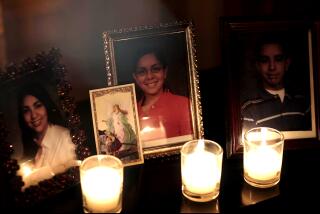Experts Say Razo Fits Pattern of Self-Destructive ‘Sun Children’
- Share via
Although reasons for the armed robbery spree attributed to Jose Luis Razo Jr. remain murky, and the only explanation is an uncorroborated tale offered by the Harvard sophomore himself, psychologists say it is not uncommon for so-called “sun children”--the bright spots in a minority community--to suddenly self-destruct.
Although Razo’s motive is unknown at this point, psychologists speculated that his story may fit a pattern. A certain number of minority youth who excel beyond expectation have been known to suddenly plummet, either through drugs, alcohol, violence, gambling or by withdrawing from their successful activities, experts said.
Some are victims of the “imposter syndrome.” Never having believed in their own talents, they feel that they have been pulling the wool over people’s eyes for years, said Ken Fineman, a forensic psychologist and associate professor of medical psychology at UC Irvine School of Medicine. “On occasion, they’ll engage in behavior that’s very risky. One may assume it has to do with their wish to be found out, to be punished for the things they’ve been getting away with for a long time.”
Moreover, students moving quickly from one cultural environment to another may suffer culture shock and act impulsively, he said.
Depending on any involvement with drugs or other factors, Razo’s apparently bizarre turnaround may have nothing to do with pressures of being a minority student, psychologists said. But many minority students feel ostracized by both worlds and believe that they fit into neither, they said.
Coming to Grips With Conflict
While many of those students come to grips with their conflict, others may become discontent, aggressive and “interpersonally sensitive,” said Peter Fernandez, a clinical psychologist at the Southwest Guidance Center in Liberal, Kan., who has studied the racial-emotional responses of Mexican-Americans.
“Being called a ‘wetback,’ to a person who is interpersonally sensitive, is like cutting him with a knife,” he said.
Razo’s statement, in a jail-house interview, that he would not “sell out my own ethnic identity,” indicates that he is not assimilating, Fernandez said. “What this guy’s doing is like crying out: ‘Get me out of this situation.’ ”
Some suggested that for ethnic minorities, the pressure to excel in sports is more intense and that Razo’s playing football at Harvard may have made matters worse for him.
Although the potential culture shock for disadvantaged students at Ivy League universities is apparent, the problem exists at all universities, said Herbert Freudenberger, a psychoanalyst working with adolescents in New York City.
“They often feel (like a) token and not accepted,” he said. “Depression is usually a problem, or they are close to flunking out.” Razo may have turned to armed robbery as a way of denying depression with excitement, Freudenberger said.
Razo’s case, however, left Fineman puzzled. “A kid that has been an achiever all the way through school usually has values consistent with the majority. The values of the criminal element are very different.”
More to Read
Sign up for Essential California
The most important California stories and recommendations in your inbox every morning.
You may occasionally receive promotional content from the Los Angeles Times.













